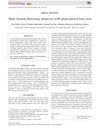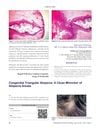Search
for
Sort by
Research
720-750 / 934 results
research Alopecia Areata Masquerading as Frontal Fibrosing Alopecia
Alopecia areata can look like frontal fibrosing alopecia, making diagnosis hard.

research Male Frontal Fibrosing Alopecia with Generalized Hair Loss
A 66-year-old man with a rare case of male frontal fibrosing alopecia did not regrow hair despite treatment.

research Topical Tofacitinib for Patients with Lichen Planopilaris and/or Frontal Fibrosing Alopecia
Topical tofacitinib cream may help treat certain hair loss conditions with fewer risks.

research Congenital Triangular Alopecia: A Close Mimicker of Alopecia Areata
CTA is often mistaken for AA but doesn't respond to steroids and may require hair transplantation.

research Alopecia Areata: Probing the Deforestation
The document concludes that doctors should recognize congenital triangular alopecia to avoid unnecessary treatments, as it does not respond to steroids like alopecia areata does.

research Renbök Phenomenon: Alopecia Areata Sparing Psoriasis Plaques
Alopecia areata does not affect areas with psoriasis plaques.

research Congenital Triangular Alopecia: Is It Always Confined to the Fronto-Temporal Region?
Congenital triangular alopecia can occur outside the typical fronto-temporal region.
research A Case of Topical Ruxolitinib Treatment Failure in Alopecia Areata
Topical ruxolitinib failed to regrow hair in a 66-year-old with alopecia areata.

research Androgenetic Alopecia in Gender Minority Patients
AGA treatments like minoxidil and LLLLT are safe and effective for gender minority patients.

research Female Androgenetic Alopecia: New Pathophysiological Factors and Future Trends for a More Comprehensive Clinical Approach
New factors in female hair loss include genetics, hormones, stress, and inflammation; future treatments should also focus on these areas and consider the patient's emotional well-being.

research Hair Loss
Some alternative treatments may help with hair loss, but more evidence is needed to confirm their effectiveness.

research Frontal Fibrosing Alopecia: Clinical Presentations and Prognosis
FFA is more common in postmenopausal women, can affect younger women, and may stabilize over time.

research Scalp Dermoscopy or Trichoscopy
Trichoscopy is a quick, noninvasive method to diagnose hair and scalp disorders, often reducing the need for biopsies.

research Treatment Strategies for Alopecia
Some treatments work for common baldness, but there's less evidence for other hair loss types, and more research is needed.

research Clinical Approach to the Patient With Alopecia
Most hair loss disorders can be accurately diagnosed and treated in an outpatient setting.

research Alopecia in Children: The Most Common Causes
The four main causes of hair loss in children are fungal infections, pulling out hair, autoimmune hair loss, and stress-related hair shedding.

research Oral Isotretinoin Combined with Topical Clobetasol 0.05% and Tacrolimus 0.1% for the Treatment of Frontal Fibrosing Alopecia: A Randomized Controlled Trial
Taking oral isotretinoin with creams worked better for treating a type of hair loss than creams alone.

research Alopecia in Children
Most hair loss in children is caused by a few common conditions and is easy to diagnose, but rare types require careful evaluation.

research Hair Loss in Children: Causes, Impact, and Management
Children's hair loss has many causes and requires careful diagnosis and personalized treatment, including emotional support.

research Hair Loss in Hospital Medicine: A Practical Guide
The guide helps clinicians diagnose and manage hair loss, detailing examination techniques and treatments for different types of alopecia.

research Hair Loss in Infancy and Childhood
The document concludes that understanding hair biology and recognizing hair conditions are crucial for managing and treating hair loss in children.

research Diagnosis and Management of Hair Loss in Children
Children's hair loss can be caused by various factors and should be treated with appropriate, age-specific methods and psychological support.

research Hair Loss in Infancy and Childhood
The document concludes that proper diagnosis and management of hair loss in children require a detailed examination and understanding of various hair disorders.

research Hair Disorders
The document concludes that accurate diagnosis and appropriate management are crucial for treating various hair disorders, which have significant psychological impacts.

research Alopecia – Focus on Negative Emotional Impact
Alopecia causes significant emotional distress and psychological issues, requiring combined skin and mental health treatment.

research Australian Hair and Wool Research Society Cutaneous Biology and Endocrinology Workshop
The workshop highlighted the genetic links and psychological impacts of hair loss and skin disorders.

research A Cross-Sectional Study on Post-Coronavirus Disease Hair Loss at a Tertiary Care Hospital
Many patients experienced hair loss after COVID-19, with women affected more, starting on average 49 days post-infection.

research Instant Follicular Hair Unit Transplantation in Androgenetic Alopecia: The Evolving Scenario
IFHUT shows better hair growth than FUE, but needs improvements in positioning, speed, and accuracy.

research Comprehensive Transcriptome Profiling of Balding and Non-Balding Scalps in Trichorhinophalangeal Syndrome Type I Patient
The study found genetic differences related to hair development that may explain hair loss in a patient with Trichorhinophalangeal syndrome type I.